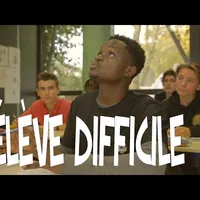L'élève difficile - avec OBSERVATEUR
Der schwierige Schüler - mit OBSERVATEUR
The difficult student - with OBSERVER
El alumno difícil - con OBSERVADOR
دانش آموز دشوار - با OBSERVATEUR
L'alunno difficile - con OBSERVER
難しい生徒 - OBSERVERとともに
어려운 학생 - 옵저버와 함께하기
De moeilijke leerling - met OBSERVER
Trudny uczeń - z OBSERWATOREM
O aluno difícil - com o OBSERVADOR
Трудный ученик - с OBSERVER
困难的学生 - 观察者网
(Franjo) - Bonjour !
(Franjo) - ¡Hola!
- Aujourd'hui, on va faire une dictée...
- Hoy vamos a hacer un dictado...
... Vous sortez de quoi noter, s'il vous plaît...
... ¿Quieres tomar algunas notas, por favor ...
... Florent ! ... Faut que tu sortes de quoi noter.
... ¡Florent! ... Tienes que sacar algo para escribir.
(Florent) - Oui, je vais noter avec mon portable ...
(Florent) - Sí, lo apuntaré en mi móvil ...
... Comme ça, je ferai pas de fautes ...
... Así, no cometeré ningún error ...
(Franjo) - C'est pour voir si tu es fort en orthographe donc y a pas le droit aux téléphones...
(Franjo) - Es para ver lo buenos que sois con la ortografía, así que no se nos permite usar los teléfonos...
... Donc sors un ... un cahier !
... Así que saca... ¡un cuaderno!
(Florent) - Tu as compris ce qu'il a dit, là ?
(Florent) - Did you understand what he said?
(¿Entendiste lo que dijo?
(Maya) - Oui.
(Sí.
(Franjo) - Allez ... On t'attend...
(Franjo) - Vamos ... Te estamos esperando...
... Alors, c'est une dictée d'André Malraux. On l'a vu la semaine dernière...
... Así que esto es un dictado de André Malraux. Lo vimos la semana pasada ...
... Vous vous souvenez qui c'est ?
... ¿Recuerdas quién es?
Tu t'en souviens, Florent ?
¿Te acuerdas, Florent?
(Florent) - Oui, monsieur. C'est le Monsieur ...
(Florent) - Sí, señor. Es el señor ...
... Qui joue au Bayern de Munich, là.
(Franjo) - Euh non ... pas du tout !
Bref ...
... C'est un écrivain.
Bon ! ... Vous êtes prêts ?...
... Alors : "Jérôme ...
... faisait de la bicyclette ... "
... montó en bicicleta... "
(Franjo) ... bicyclette ...
Comment t'as écrit "bicyclette", là ?
¿Cómo se escribe "bicicleta"?
(Florent) - Bicyclette, vélo, c'est la même chose là. Non ? ...
(Florent) - Bicicleta, bicicleta, aquí todo es lo mismo. ¿No? ...
... C'est pas le truc qu'on pédale, là ?
... Isn't that the thing you pedal?
... ¿No es eso lo que pedaleas?
(Franjo) - Mais, c'est pas un vélo ... Je veux "bicyclette", pas vélo ...
(Florent) - Vélo, bicyclette, c'est la même chose là ...?
(Franjo) - Attend, mais comment t'as écrit "Jérôme", toi ?
(Franjo) - Wait, how did you spell "Jérôme"?
(Florent) - J'ai rome, j'ai faim, j'ai froid ...
(Florent) - I'm rome, I'm hungry, I'm cold ...
(Florent) - Estoy en Roma, tengo hambre, tengo frío ...
(Franjo) - Ah ouais, là, c'est ... C'est grave là !
(Franjo) - Oh yeah, that's ... This is serious!
(Franjo) - Oh sí, eso es ... ¡Esto es serio!
Très bien, bon, tu vas aller prendre... l'air.
All right, well, you go get... some air.
Está bien, bueno, vas a tomar un poco de... aire fresco.
(Florent) - ... "va prendre de l'air"
(Florent) - ... "va a tomar el aire
(Franjo) - Mais il est con ! Arrête de noter !
(Franjo) - But he's stupid! Stop writing!
(Franjo) - ¡Pero es estúpido! ¡Deja de escribir!
(Florent) - ... "Il est con, arrête de noter" ...
(Florent) - ... "Es un idiota, deja de escribirlo" ...
... Monsieur, vous allez vite ! Hein !
... ¡Señor, va muy rápido! ¡No voy!
(Franjo) - Trés bien ! Tu vas aller faire le mariole, dehors !
(Franjo) - All right! You're going to play the fool outside!
(¡Muy bien! ¡Vas a ir a hacer el tonto fuera!
(Florent) - ... "aller faire le mariole dehors"
(Florent) - ... "vete a hacer el tonto fuera"
(Maya) - Monsieur, comment on écrit : "mariole" ?
(Maya) - Sir, how do you spell "mariole"?
(Señor, ¿cómo se escribe "mariole"?
Sous-Titres : PVCH Sous-Titrage

